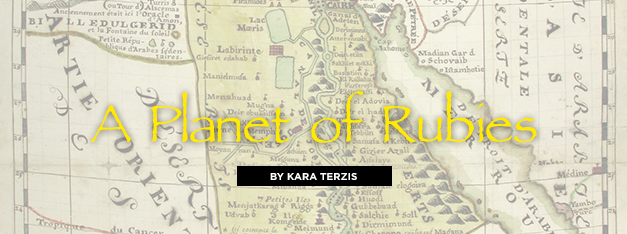
It’s that time again, REUTies! We’re beginning our Project REUTSway 2014 Runner-Up Tour! Check back every Friday for a new short story from our 2014 competition, and be sure to follow @ProjectREUTSway on Twitter to stay up-to-date on news about the published anthology and future competitions!
Without further ado, here’s the first short story a part of our tour:
Roza knows if she is not sold today, she will die.
She knows this with an iciness deep in her bones, that settles in her lungs, and freezes her limbs together as her fingerprint is scanned, confirmed, and she is pushed roughly through the door. The Slave Markets of the City of Sand are bright and buzzing, not that she can hear a sand-ridden thing. Roza is shoved behind a thin glass wall that separates her from the world outside. She can see face after dark, sun-tanned face staring at her. Examining her.
The thought makes her nervous – though really, should it? This is now the fourth time she has been put up for sale since she was orphaned. The first time, she ran away; when her master found her lurking deep in the markets, he had whipped her and sold her. The second time, she killed her master by sticking a dinner knife through his eye; and finally, her last master – who had been wrinkly and gray – had died from old age. So here she is again.
Roza is a cheap slave. She is worth nothing.
In fact – the clothes that cling to her thin frame are probably worth more than she is.
Who is going to want a slave who has murdered her predecessors? By law of the planet Rubinus Eknah – which roughly translates to “the ruby planet” – it is a crime most horrendous to kill a slave. Rape, torture, beat . . . That is all within the Law of Eknah, but murder is most foul. Yet there are some days where Roza wishes she could be killed.
She is kept in a cell until the next slave sale – which occurs monthly – and she has no desire to spend those achingly long weeks with the rats.
She would rather be dead.
* * *
He is walking through the City of Sand when he sees her.
It’s her skin he notices first. Dark – like most Eknahns – but paler than usual, as if she has spent an abnormal amount of time hidden away somewhere dark. It’s her expression that captures his interest expression . . . or, more accurately, the lack of an expression. She stares out of the swelling mass of people and fingers her plain garments, as if disinterested. Darakai frowns, palming some of the sweat from his eyes; it is always hot outside, no matter the season. This girl, he muses, looks much too beautiful to be a slave.
And of course, Darakai is intrigued.
Darakai looks at the positions of the two suns in the sky, gauging an idea of the time – and then looks over to the masses of people that are accumulating around the glass box where the girl stands it. She can’t be much younger than he is – perhaps sixteen?
Seventeen?
The bidding is due to start at any minute, and Darakai’s heart pounds. Sweat stings his eyes. Should he? He shouldn’t. But he does. Gathering his pouch of rubiuns, which glow a crimson red in the dimming light, he moves forward until he is at the front of the crowd.
Darakai looks straight at the bidder. “How much for her?”
“The bidding has not started yet,” the bidder replies.
Darakai lifts his head higher, revealing his golden eyes that are stark against his skin. “I am Darakai the Third, set to become Pharaoh after my father passes his crown to me. So, I’ll ask you again: How much for the girl?”
The bidder blinks. Flushes a dark red. Sweat falls into his eyes. Darakai thinks with a pale sort of amusement that this man wouldn’t have ever of seen someone of Darakai’s statues before – let alone being in the presence of them.
“Y—your majesty,” he croaks. “I beg your pardon . . . I—I couldn’t possibly ask for money from one such as you . . . I . . . take her, if you will.”
Darakai breathes out. Runs a hand through his thick dark hair.
He does not want to be treated like this – but he was the one who brought his high status up in the first place. “Tell me,” says Darakai, “how much for the girl. Now.”
The bidder is nearing a shade of purple now. “I—I—”
Darakai snaps. “Will you accept a payment of one-thousand rubiuns?”
A sharp intake of breath from the crowd around him. Then, “A—a thousand rubiuns? Why, your highness, I suppose if you insist. But let me assure you, this slave – she is not worth that much rubiuns. She is a killer. Did you know that?”
Darakai angles a look up at the slave girl. She does not look like a killer.
But what exactly do killers look like?
Darakai feels warmth flood his chest – a warmth so much different from the cloying heat that swirls around him. “Then it is a deal,” he says simply. “A thousand rubiuns, and she is mine.”
* * *
Roza does not understand what is going on.
She is being hauled from her glass box before the bidding could even start, and is now in a lavish and bright bathroom, complete with mirrors – though she does not dare to look at her reflection – and being stripped naked. And there are now servants all around her.
Washing her.
Cleaning her.
Drizzling perfume oil in her bath.
Then she is done, and she’s being yanked from the luxurious warmth of the water she is not used to, and fluffy white towels all around her. The servants don’t speak to her – no matter how many times that she asks, no matter how loud or insistent her voice becomes.
She’s dressed in a white gown, thick but cool at the same time, with rubies embedded into the hems, sewn into the sleeves. It’s beautiful . . . almost too beautiful.
It is now dark.
Roza looks out the windows and sees the triple moons gleaming in the sky, confusion tugging at her chest. Has she been sold? Released? Are they going to kill her?
She does not know.
The servants pull her through a wide, open hallway, with gold and marble and glass gleaming at her from every angle. “Tell me,” she pleads, “tell me, what is happening?”
Again, no answer.
Now she is being pulled down the staircase in such a hurry that she feels like her feet are flying. Then she comes to a halt – or, tries too, anyway. She’d been moving so fast that she slams into something and falls backward; gasping, Roza gets unsteadily to her feet.
“Oh,” she says, when she realizes who is standing in front of her. Oh indeed.
Prince, son of Pharaoh Eknid, does not speak. His eyes are bright, mimicking the colour of the golden walls around her, but he stares at her.
“Is she ready?” he asks the servants; they nod.
Then, before Roza had fully understand what has happened, she is whisked away into the night.
* * *
Roza has never ridden a camel before.
They are large and ungainly, and she wobbles from time to time.
But she needs to speak to Darakai. She needs to. “You bought me,” she says.
“I did.”
“May I ask why, your highness?”
“Please, call me Darakai.”
Roza hesitates for a moment. “Very well, Darakai. Why did you buy me? And where to you plan on taking me? To the palace?”
“No, not to the palace,” says Darakai.
Oh, isn’t he helpful? Rosa thinks; but she knows better than to say this out loud, so she bites her tongue.
“Tell me your name,” says Darakai, softly.
“Roza.” Her voice is quiet, simple, elegant.
Beautiful, thinks Darakai. Beautiful.
* * *
Most of the time is passed in silence. They spend days wandering the endless ocean of sand, but it isn’t until the fifth night in the desert that he sees her scars.
They run up and down her back in thin, white lines. They are years old. Darakai knows this, but he still can’t help the bubbles of anger that well upside of him, like the bubbles in the eastern hot springs. He longs to take her into his arms and pull her close.
He does not, though, for Roza – at least now he knows her name – turns, and seems him watching. She tries to cover herself, and a dark, rose-red blush covers her cheeks.
Darakai turns away, politely, and in this moment he realizes this girl was not born to be a slave. No – not at all. She was born to be his queen.
* * *
Roza is astonished when she realizes where Prince Darakai intends to keep her. The estate is large and exquisite, with gold-and-ruby entwined marble pillars and a garden resting gently in the centre. Located in the garden, too, is a shallow pool perfect for bathing.
It is beautiful.
“What is it you intend for me to do here, your highness?” asks Roza. The two suns glare down from the position in the sky and Roza feels sweat trickle down her back and pooling between her breasts. “Clean? Cook? Entertain? Anything you desire, I am here.”
Darakai turns to her, sliding off his camel and giving Roza a hand off hers; she is uncomfortable and sore from sitting in the saddle for so long, and she stumbles a little. Darakai grins brilliantly at her – more brilliant, Roza thinks, than the suns themselves.
“My lovely Roza,” Darakai says. “I do not intend for you to work here. I intend for you to live here.”
* * *
Months pass. It’s a blur of colour and dazzling riches and laughter, and Roza is happier than she has ever been in her life. Darakai showers her with jewels and silk and food beyond her wildest dreams; he is often gone, leaving for the palace, and this saddens Roza.
She is not lonely when he is gone. There are servants and plenty of things to occupy her time. She cooks, she cleans, she shares stories. In particular, Roza has a particular talent for creating fabulous things from the jewels Darakai gives her. One day, she makes a pair of rose-red slippers that gleam and sparkle in the light; they are made entirely from rubies.
Her mother had owned a similar pair, she knew; a pair she had been clutching when she had been beheaded. The slippers made her feel closer to her mother, somehow, and ever since their creation, Roza had not let them out of her sight.
Yet even with all these things to steal her time, she thinks of Darakai often.
For she is beginning to wonder if there is something more than friendship kindling between the two. She can sense it in the light touches on their skin, and the way she catches him stealing glances at her whenever he thinks she’s not looking. But it’s not until the night before Darakai is due to leave for the palace that she presses her mouth to his.
He returns the kiss, perhaps a little surprise, but nevertheless, he cups the back of her neck and groans into her mouth, wrapping his arms tightly around Roza.
“I will miss you,” Darakai says, when they finally pull away.
“And I you,” says Roza.
* * *
Darakai does not know what he is traveling back to. But when he reaches the great gates of the City of Sand, and sees people dressed in black, and the jasmine – a sign of respect in Rubinus Eknah – strewn across the floor, what has happened.
His father is dead.
And he is now Pharaoh.
* * *
She is in the pool in the garden when it happens. Her rose-red slippers are lying beside the pool, catching on the late afternoon sunshine. Something dark blots Roza’s vision – and she looks up, surprised. A bird, bigger than she has ever seen in her life, is beginning to descend.
Before Roza can so much as open her mouth in shock, the eagle – whose feathers are as bright and gold with eyes as cunning as a snake’s – swoops down and snatches the rose-red slippers from behind her. Roza cries out, distraught, but it is too late.
When she looks up again her rose-red slippers are nothing but a distant gleam in the sky.
She scrambles out of the pool and dries herself, slipping on the first clothes she can find, and races out the estate gates. She must find those slippers. She must.
* * *
Prince Darakai is just about to leave court for the estate when the eagle swoops down from the sky. Its eyes gleam fiercely in the light from the suns, and it is holding something in its clawed talons. The eagle seems to narrow his eyes upon the prince, and drops it at his feet. Miraculously, it does not shatter. Darakai picks it up with shaking hands.
They are his love’s, Roza’s, slippers. But . . . Only one of them.
So where is the other?
Darakai knows with a bone-chilling certainty that Roza would not let them go. Ever. Which begs the question: if her slippers are here, then where is Roza?
He rushes to the estate days later, sand strewn in his hair, ready to pull Roza lovingly into his arms . . . but she is not there. She has vanished. She is gone. “She left a week ago,” says one of the servants. “She feared for her rose-red slippers, and went in search on them.”
Darakai looks down: he is holding the rose-red slippers.
* * *
When he arrives back in the City of Sand, everything is quiet.
Darakai dashes through the city, back through the high road lined with palm trees, and back into the coolness of the palace. There, he puts out a royal decree: “Those who seek the owner of this rose-red slipper shall be rewarded beyond imagination; for she is my dearest love, and she is missing.” Then he adds, to himself, Please, gods, if you are listening. Help me. Darakai the Third begs it of you. I have already lost my father . . . I cannot lose her, too.
Weeks pass. A million thoughts whirl through his head, like a grain of sand being tossed about in a sandstorm. Is she dead? Has she perished in the desert? Or perhaps she has abandoned him? He cannot think straight . . . every thought of her turns out more horrible than the last. Gods, he thinks, again. Please, let her be safe.
* * *
She is dying.
She is wrapped in a blanket of sand. It stings her eyes, her throat, her nose.
She cannot breathe properly. She looks up at the two suns during the day, forcing herself to walk step after step; she looks up at the three moons at night, shivering, shivering, shivering. She cannot make it. Her camel died three days ago; she has run out of water.
She clutches on tight to the red-rose slipper. She had found it three days after traveling through the desert, and has refused to let go of it since. The slipper is her one comfort, her one constant, her one companion.
She is dying.
But there – there . . . What is that? Is that a city? Roza sees the peaks and curves of a palace in the distance. She wonders whether it is mirage. She wonders if these are the gates of heaven and she is done. She wonders many things, as she staggers through the gates.
But most of all, she wonders about Darakai.
Her lone rose-red slipper she has been holding all this time falls to the floor. It shatters like red glass. And Roza the Slave fades into blackness.
* * *
She awakes to Darakai brushing back her hair.
I am alive. The words cross her mind and she gasps, jolting up in the smooth, silken bed. “Darakai . . . ?” she croaks; her voice is uncertain, and parched. Soon, cool water is being pressed to her mouth and she swallows and swallows and swallows. She starts to cry.
“Shh.” Darakai stokes her hair. Presses kisses to her face. Whispers in her ear.
Roza tells him about the shattered slipper, but Darakai only smiles. “I had a servant repair it,” he says gently – and suddenly, he brings out a pair of gleaming rose-red slippers.
“Thank you,” she whispers. She moves to kiss him again, but Darakai takes control: he moves her gently across the bed and settles beside her, pressing his mouth along her jaw, down across her collarbones, and finally, to her mouth.
“Roza,” he murmurs, eventually, once the sun has vanished from the sky and the ruby planet is bathed in silver moonlight, “how would you feel about being my wife?”
Roza smiles; for the first time in her life, she feels beautiful. “I would be honored.”
THE END
Follow Kara on her Twitter (@Kara_writes16) and check out her website.





